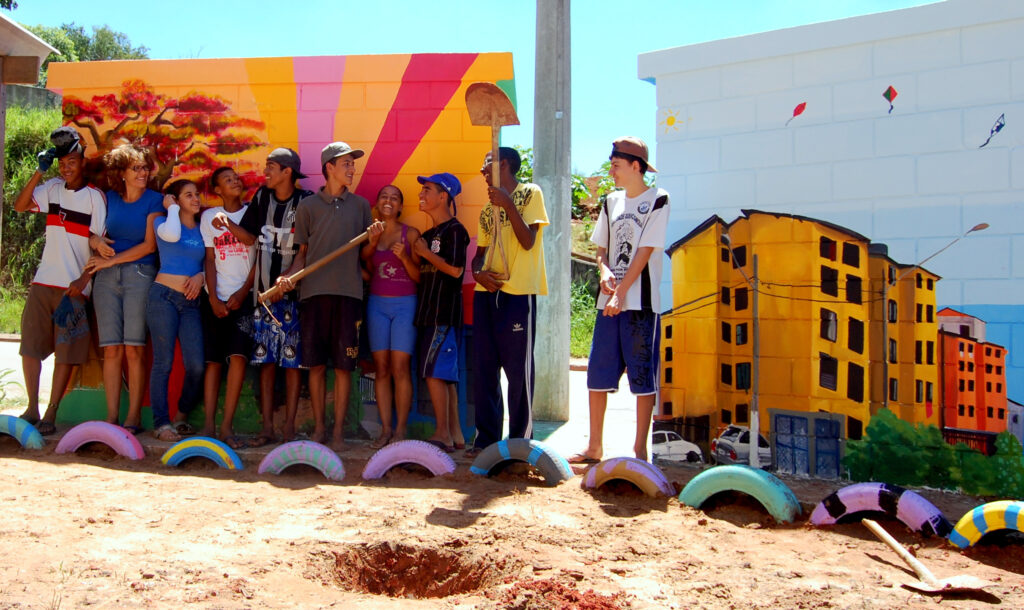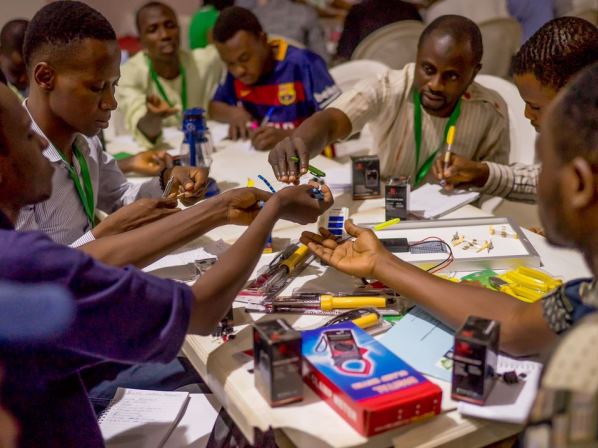About us
Youth and Cities
Young people living in fast-growing cities will play a crucial role in shaping the future of these urban areas. While urbanization presents both opportunities and challenges, the contribution of young people is highly valued. The rapid urbanization of developing countries is expected to have a significant impact on the social, economic, and environmental profiles of these areas.
Our world
is urban
55% of the global population currently residing in urban areas and there is an anticipated increase to 68% by 2050.
Our world
is youthful
There are more people under the age of 25 to-day than ever, totaling nearly three billion or almost half of the total global population; 1.2 billion of that total are between the age of 12 and 24.
Many youth live
in the developing word
Cities in the Global South account for over 90% of the world’s urban growth and youth account for a large portion of this increase. It is estimated that as many as 60% of all urban dwellers will be under the age of 18 by 2030.

Partnering with Youth and Cities
UN-Habitat is one of the preeminent international agencies working on urban youth policy, research, and programming. Historically, youth have not been seen as a demographic important enough to engage in decision-making —this is especially true for the world’s most youthful regions such as Africa. Yet there has been a growing understanding and concern over the declining socio-economic situation of young people and their lack of livelihood opportunities. Youth often grow up in poverty and they are excluded from the economic, political, and social life of their countries, which in turn breeds disillusionment and hopelessness, violence, and upheaval.
Youth are in the most productive times of their lives can leverage the “urban advantage”, a concept relating to the abundance of goods, services such as health, recreation and education, amenities, and opportunities found in cities. No country has achieved any level of prosperity without urbanization; cities account for approximately 70% of global GDP, and as much as 55% of the GDP in low-income countries. It is anticipated that 80% of future economic growth will take place in cities. With youth globally being the best educated in history, they are well positioned to leverage.
To read more about your hand cities please check out our research and read about how youth contribute to prosperous and inclusive cities.

Kampala Principles of Youth-Led Development
In 2007 representatives from the UN-Habitat´s One Stop Youth Resource Centres originating from four capital cities in East Africa gathered together in Kampala, Uganda. They came together with the goal of determining what were the core working principles of the One Stops which would assure that youth had the best experience possible, in a way which was sustainable over the long term and which recognized youth as leaders today.
Fast-forward 13 years later, and the One Stops have become a model of youth development. The principles that those representatives agreed to – now called the Kampala Principles on Youth-led Development – are now in use not only by the One Stops but by youth programmes globally. They have become the basis for ongoing research undertaken by UN-Habitat through the Global Youth-led Development research series which explores youth-led agencies, how they function, their impact and how they can be best supported. And lastly, the principles and the concept of youth-led development has begun to influence policy at the local, national and global level.
The 5 Kampala principles of youth-led development are:

- Youth define their own development goals and objectives;
- Youth have a safe and generative physical space;
- Adult and peer-to-peer mentorship;
- Youth act as role models for other youth;
- Youth are integrated into local and national development programmes and policies.
One Stop Youth Resource Centres
Though youth are vital to the prosperity of cities in the developing world, they still face many barriers — most notably underemployment and unemployment, and a lack of access to basic services such as healthcare and education — which prevent them from reaching their potential. UN-Habitat has worked with cities globally to overcome these barriers through the development of programmes that achieve three key objectives:
- Improve youths’ livelihoods by increasing their employability
- Decrease their vulnerabilities
- Integrate them fully into the economic and social life of the city
These programmes assist youth to become leaders in their communities and to lead healthy and productive lives.
Over the past two decades UN-Habitat has established, together with its partners, One Stop Youth Resource Centres (One Stops) in cities across Africa, Asia and Latin America. Each One Stop is unique in the programmes it delivers, responding to the needs of the local youth population. Its core programmes are sports and recreation, job skills and entrepreneurship training, health services such as HIV/AIDS testing and counseling, and support for youth-led governance and planning. The One Stops are built on partnerships between UN-Habitat and the local government, civil society, youth, and the private sector to develop programmes which respond to the needs of the youth.
For more information please see our publications on the One Stops.
If you want to learn more on how to be accredited as a One Stop centre please click here.
